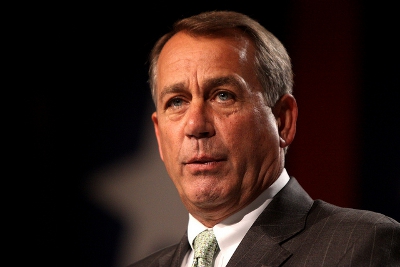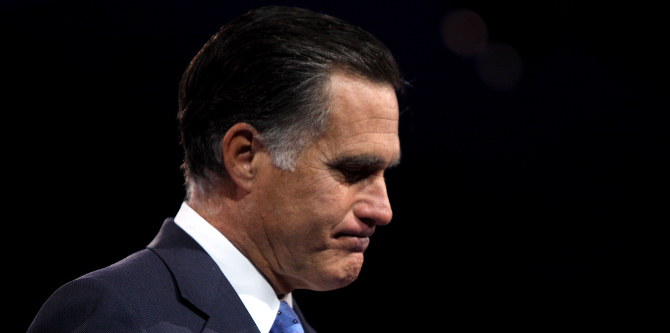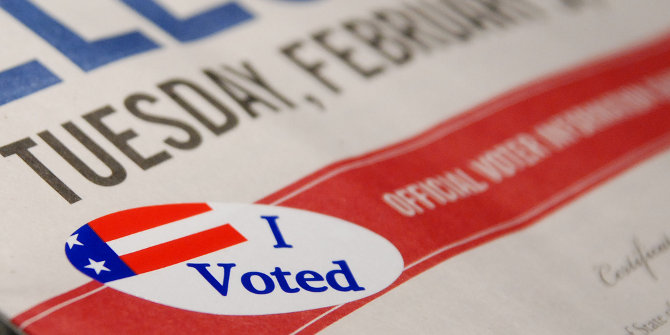USApp Managing Editor, Chris Gilson, looks at the best in political blogging from the Beltway. Our round-up of state blogs will follow on Saturday afternoon.
Government, the Beltway and Congress’ agenda
Immigration reform has been a contentious issue already this year, with many accusing Republicans of dragging their feet on a potential amnesty for undocumented migrants. On Tuesday, The Foundry writes that many liberals are hoping to prolong the debate as much as possible as it allows them to continue their false narrative that conservatives are against it.
This week say Congress debate and pass legislation to raise the debt ceiling until 2015. The speed that this occurred is in sharp contrast to last year’s debates which were also part of the government shut down. Despite its speed, there was still some controversy over the move in the lead-up and the aftermath. On Saturday, The Foundry set the scene by saying that last year Congress had actually suspended the debt-limit (not raised it) until this week, and that it serves as an important check on federal borrowing and spending. On Tuesday morning PolticusUSA reported that Speaker John Boehner would propose a vote on the debt ceiling in return for the full restoration of military pensions (worth around $7 billion). They say that the GOP’s push to increase spending in exchange for a debt limit rise is somewhat at odds with its previous calls to reduce spending. This demand was put aside, as Republicans could not reach a consensus on it. The Atlantic takes a close look at why the GOP has ‘surrendered’ on the debt ceiling, saying that three years of these sorts of fights, which led to last year’s shutdown, have made Republicans much more realistic and pragmatic about the power that they are able to exercise.

On Tuesday the ‘clean’ debt ceiling was passed by the House, reported FreakOutNation, but with only 28 Republicans voting in favor, to 199 against. Despite this year’s debt ceiling being overcome this week, Perrspectives reminds us that the debt ceiling will have to be raised by over $8 trillion over the next decade. National Journal looks ahead to Congress’ agenda post-debt ceiling, but finds that there are actually very few big-ticket legislative aspirations for the rest of the year. PoliticusUSA says that Speaker Boehner is now facing opprobrium from far-right conservative groups, such as The Club for Growth and Heritage Action, for bringing the debt ceiling vote to the floor. Some of them are even calling for Speaker Boehner to be replaced, they report.
The Democratic Party, the GOP and elections
On Saturday, PoliticusUSA looks at President Obama’s weekly address. In it he acted as what they describe as ‘Explainer –in-Chief’, by addressing how he would use the power of his recently declared ‘phone and pen’ to help the middle classes in the face of an uncooperative Congress. Meanwhile, The Volokh Conspiracy writes that Obama really is bypassing Congress by suspending some parts of the employer mandate of his signature Affordable Care Act policy (Obamacare), which they say is a large-scale selective rewriting of what should be a legislative function.
On Monday, Roll Call’s RothenBlog looks at the fundraising of the Democratic Congressional Campaign Committee (DCCC) and the Democratic Senatorial Campaign Committee (DSCC). While the DCCC now has $29 million in cash on hand ($8 million more than their Republican counterpart), the DSCC raised more than $16 million more than the National Republican Senatorial Committee, but its debts mean that they both have a similar level of ready cash, $8 million. Meanwhile, The Monkey Cage takes a close look at how the ‘midterm penalty’ is hurting the Democrats. They write that the party only has a one percent chance of retaking the House in this November’s mid-term elections. On Tuesday, Republican Kevin Faulconer easily won the San Diego mayoral election. National Journal writes the next day that his win (in an Obama friendly city) highlights a problem that Democrats are likely to have in the midterms – low turnout. Looking towards the Presidential election, National Journal looks at whether or not the likely Democratic candidate, Hillary Clinton, is blocking a new generation of Democratic leaders, and whether or not the party should be building up a team of young, compelling leaders for the future beyond 2016. Crooks & Liars argues for less media coverage of Hillary Clinton’s potential for 2016, saying that there needs to be more focus on this year’s mid-term elections.

Moving to the other side of the aisle, and the Republican Party’s likely candidates for the 2016 presidential elections, PolticusUSA writes that the Governor of Wisconsin, Scott Walker may well be out of the running due to a new investigation into apparently illegal campaign coordination during his 2012 recall election. On Monday, The Atlantic looks at why another potential candidate, Senator Rand Paul, is using Monica Lewinsky and Bill Clinton to attack the Democratic Party’s record on women’s rights. They say that Paul is speaking to the Christian right, and that these attacks are a safe way to champion moralism. On Wednesday, United Liberty reports that Paul has also filed a class action lawsuit against President Obama and intelligence officials over the National Security Agency’s domestic surveillance programs. Still looking to 2016, The Atlantic looks at former Florida Governor (and Presidential son and brother) Jeb Bush, who is beginning to seem a more attractive candidate given the scandal that recently hit New Jersey governor, and previous favorite, Chris Christie.
After the House voted to raise the country’s debt ceiling this week, The Feed writes that the GOP have scored a big win from the vote. They say that if the party does win the Senate this year, then it will have a much stronger hand for the next debt ceiling vote. While the debt ceiling vote was eventually passed by all of Congress, it was not before Texas Senator Ted Cruz had announced that he would filibuster the measure in the Senate. Cloture was invoked to cut off Cruz’s potential filibuster, but this only occurred with the help of Republican Senators. The Atlantic writes that in forcing Republican leaders like Mitch McConnell and John Cornyn to vote for cloture, Cruz has given their primary opponents more ammunition to hit them with. Later in the week, Daily Kos writes that given that most (88 percent) House Republicans voted against the debt deal, this shows that the GOP’s interests are not aligned with those of the country. Moving to the GOP’s Senate fortunes this fall, Daily Kos writes that while the Republican is looking to retake the majority from the Democrats, they first must first survive their own primary season and select candidates who can win.
Daily Kos looks a new map that shows that while most Democrats live in cities, Republicans tend to be based in outer suburbs, or ‘exurbs’.
Affordable Care
While the debt ceiling dominated much of U.S. political commentary this week, there were developments in the Obamacare story that also stepped into the political limelight. On Monday, United Liberty writes that the new contractor charged with maintaining the federal Obamacare exchange, Healthcare.gov, Accenture, has both a questionable history, and is a contributor towards President Obama as well. The big Obamacare news this week, however, is the extension of the employer mandate for companies with 55 to 99 employees to the beginning of 2016, as reported by White House Dossier. On Monday, Red State writes that the extension has been put in place so that employers do not reduce their full time staff or increase their number of part-time workers. Wonkblog looks at what would happen if the employer mandate was removed. Their conclusion? Very little. Meanwhile, The Atlantic writes that Obama’s decision to delay the employer mandate is the latest in a string of ‘self-inflicted’ wounds. They say that while Obamacare is moving forwards, these sorts of decisions may be handing political weapons to Republicans. ON Thursday, Lonely Conservative reports on the recent release of documents that show that Secretary of Health and Human Services, Kathleen Sebelius had multiple meetings at the White House, making President Obama’s claims that he was unaware of the problems facing the Healthcare.gov site seem rather dubious.
Foreign policy and defense
On Saturday, The Foundry writes that it is concerned that the U.S. is continuing to turn a blind eye towards Chinese aggression of recent months, including, most recently, announcing that foreign fishing boats must have approval from Beijing to sail into areas of the South China Sea.
On Tuesday, The Atlantic covers the Obama administration’s delay in carrying out the extrajudicial killing of an American citizen abroad. They write that the delay is likely to stem from the legal hurdle of the Fifth Amendment that forbids these sorts of actions without the due process of the law.
The Feed reports this week that in a major policy shift, the American Ambassador to India will meet Narendra Modi, who is the current favourite to become India’s new Prime Minister in this year’s elections. They say that Modi has been accused of indifference by human rights groups towards sectarian violence in his state of Gujarat, and that this would be his first meeting with a high-ranking U.S. diplomat since his visa was revoked in 2005. Another country that has an evolving relationship with the U.S. is Vietnam. On Wednesday, Roll Call writes that increasing trade and economic ties between the two countries are slowly banishing memories of the Vietnam War.
The economy and society
On Saturday, Daily Kos reports that the continuing fall of public-sector wages (1.3 percent since 2007) are helping to drag the economy down. Meanwhile, Wonkblog writes that while the unemployment rate has traditionally been a straightforward economic indicator, it now no longer matters. They explain this by saying that the labor force participation rate is now more important, as people have given up looking for work because of the poor economy.
Crooks & Liars reports on the latest actions from business groups to fight the Obama administration’s actions to cut emissions from the dirty energy industry. They write that big business groups are willing to try anything from lobbying to litigation to thwart the President’s agenda. On Thursday, The Switch looks at the coming bid by Comcast to acquire Time Warner, the combination of which would own 1/3 of the national broadband market. Using the 1984 breakup of AT&T as an example, they say that if regulators take a hands-off approach now, they may have to be much more intrusive later on.
After Washington Governor Jay Insklee’s decision this week to suspend the state’s death penalty, National Journal looks at whether or not the death penalty is on the way out in the U.S.
And finally…
FreakoutNation reports that this week a Texas man, dressed in a banana suit, was arrested for carrying an AK-47 whilst standing at an intersection.
With the second season of the drama series House of Cards out on Friday on NetFlix, National Journal has a guide to fictional Washington newspapers, from Slugline to the D.C Sun.
The U.S. Food Policy blog writes this week that up to 13 percent of the U.S. population consumed pizza on any given day.
Please read our comments policy before commenting.
Note: This article gives the views of the author, and not the position of USApp– American Politics and Policy, nor of the London School of Economics.
Shortened URL for this post: http://bit.ly/MS3IZW






